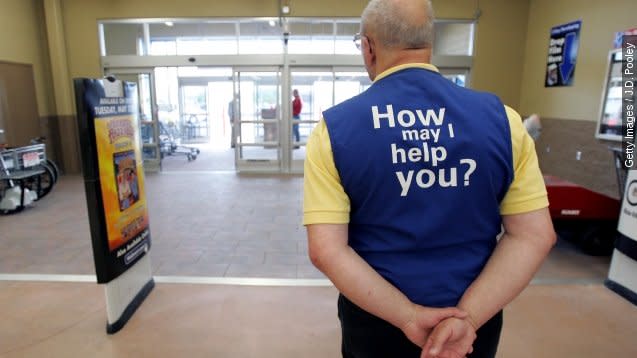Wal-Mart is getting killed in the most important category

Walmart isn't keeping up in a category that will determine the future of retail.
As Target has grown its e-commerce business, Walmart's growth is slowing, notes The Motley Fool.
In the last two years, the retailer's e-commerce growth has steadily dropped. In the most recent quarter, the company reported growth of 8%, compared to 22% in last year's fourth quarter and 30% two years ago.
For comparison, Target grew its e-commerce business 34% in the last quarter. The company's growth has been consistent in the last few years, with digital sales growth of at least 20% each quarter for the last year.
Walmart's lowly position isn't from lack of trying. Last October, the company announced it would invest $900 million in its web development, with plans to spend $1.1 billion in the coming year, working to expand online grocery and scale its online assortment.
While that is a major investment, Target is planning on spending even more, announcing in an analyst call it plans to spend $1.8 billion this year and $2.5 billion next year on supply chain and technology.
Many of Walmart's previous e-commerce innovations have simply failed to entice customers. The retailer's digital holiday sales failed to match up with the online deals at Target or Amazon (which achieved over 15% revenue growth in product sales in the quarter).
Walmart's Shipping Pass service, which offers free three-day shipping for $50 per year in test markets, is nowhere near the swiftly growing two-day shipping service Amazon Prime in terms of popularity. Walmart charges non-Shipping Pass members for shipping on orders over $50, while Target offers free shipping on orders over $25.
How can the company compete? In addition to figuring out a way to convince customers to shop for groceries online and expand e-commerce offerings, the key to digital sales seems to be linking them with the traditional shopping experience.
"We're improving our stores, adding critical capabilities and deepening our digital relationships with customers as we work to become the first to deliver a seamless shopping experience at scale," CEO Doug McMillon said in the company's most recent earnings call in February.
The "seamless" combination of different shopping channels is one that Target has also established as a major goal. Even Amazon is dabbling in the brick-and-mortar retail business, with a physical store opening in Seattle.
One way that Walmart hopes to stand out from the competition is its new mobile wallet, Walmart Pay, which the company launched in December.
"Walmart Pay is the perfect example of how our app gives customers a seamless experience that merges digital and physical to make shopping faster and easier,"Neil Ashe, Walmart's president of global e-commerce and technology, said in the February earnings call. "It gives customers a reason to form a digital relationship with Walmart."
When thinking of the future of shopping, mobile is a crucial connector for online and in-store retail. While smartphone traffic makes up more than half of all online traffic, mobile only accounts for 29% of all online sales. When it comes to grocery, the opportunity to grow mobile is even greater, with a disproportionate amount of grocery e-commerce sales coming from mobile devices, compared to categories like electronics, apparel, or books.
It's too early to tell if Walmart Pay will gain traction, but, if it does, it could drive significant app downloads and mobile purchases for the retailer. Perhaps more importantly, it could help establish Walmart as a company with the truly "seamless" shopping experience all retailers are aiming for in 2016.
Disclosure: Jeff Bezos is an investor in Business Insider through his personal investment company Bezos Expeditions.
SEE ALSO: Target executive reveals how the company is dominating Walmart and Amazon in the most important category
NOW WATCH: The most surprising brands millennials love
